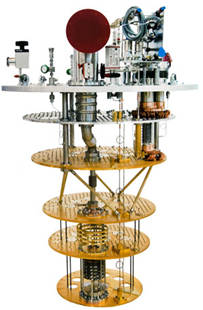Oxford Instruments is pleased to announce that its latest Cryofree® dilution refrigerator Triton™XL has been chosen to support the Networked Quantum Information Technologies (NQIT) Quantum Technology Hub, led by the University of Oxford.

The Triton™XL is Oxford Instruments’ newest Cryofree dilution refrigerator platform, with a base temperature of less than 5 mK, cooling power of up to 1000 µW at 100 mK, and a 430 mm diameter mixing chamber plate. These features allow experimentalists an even greater range of options for sample size, wiring, and magnet integration than was previously possible, while continuing to offer Oxford Instruments’ leading top- and bottom-loading sample exchange options.
The Oxford NQIT system, with the 1000 µW cooling power, will be used in the development of superconducting quantum circuits by Dr Peter Leek’s group of researchers in Condensed Matter Physics within the Hub. The TritonXL platform builds on the established success of the Triton dilution refrigerator, which has over 250 units installed worldwide.
This TritonXL system is the first of this type of large platform dilution refrigerator to be delivered to a customer in the UK. Such systems have been growing in popularity within the Quantum Sciences community, including a system with an integrated 16 Tesla superconducting magnet at the Indian Institute of Science (IISc), Bangalore, India, as well as several in the United States.
The NQIT Hub, part of the UK National Quantum Technology Programme, is led by the University of Oxford and involves 29 globally leading quantum centres and major companies, all working together to realise an entirely new technology sector. The Hub's focus is on systems that can connect together to form flexible, scalable solutions for diverse applications.
These powerful principles of flexibility and scalability have made the network the single most important concept in modern information technology, with incalculable beneficial impacts on society. The overall network can achieve things that are effectively impossible with conventional technologies. For more details on this project, visit http://nqit.ox.ac.uk.
“Oxford Instruments has considerable past experience in moving technology and methods from research labs into real product development, in application areas related to quantum technology. The new TritonXL system will be a quantum-ready cryogenic platform that allows us in our NQIT project to develop larger scale superconducting circuit prototypes, bringing us closer to realising a practical quantum computer using this technology”, says Dr. Peter Leek.
Oxford Instruments is proud to be a leading UK company providing state of the art research tools for the development of quantum technology applications, having extensive relationships with both the worldwide research community and companies bringing new commercial applications to market.
Dr Michael Cuthbert, Managing Director of Oxford Instruments NanoScience commented, “Oxford Instruments is committed to its part in delivering the success of NQIT and the other Quantum Technology Hub projects in which we are participating. To this end, we are also sponsoring a PhD student within NQIT working to develop quantum device measurement capability at ultra low temperatures.”
About Oxford Instruments NanoScience
Oxford Instruments NanoScience designs, supplies and supports market-leading research tools that enable quantum technologies, new materials and device development in the physical sciences. Our tools support research down to the atomic scale through creation of high performance, cryogen-free low temperature and magnetic environments, based upon our core technologies in low and ultra-low temperatures, high magnetic fields and system integration, with ever-increasing levels of experimental and measurement readiness. Oxford Instruments NanoScience is a part of the Oxford Instruments plc group.
About Oxford Instruments plc
Oxford Instruments designs, supplies and supports high-technology tools and systems with a focus on research and industrial applications. Innovation has been the driving force behind Oxford Instruments' growth and success for over 50 years, and its strategy is to effect the successful commercialisation of these ideas by bringing them to market in a timely and customer-focused fashion.
The first technology business to be spun out from Oxford University, Oxford Instruments is now a global company and is listed on the London Stock Exchange (OXIG). Its objective is to be the leading provider of new generation tools and systems for the research and industrial sectors with a focus on nanotechnology. Its key market sectors include nano-fabrication and nano-materials. The company’s strategy is to expand the business into the life sciences arena, where nanotechnology and biotechnology intersect
This involves the combination of core technologies in areas such as low temperature, high magnetic field and ultra high vacuum environments; Nuclear Magnetic Resonance; X-ray, electron, laser and optical based metrology; atomic force microscopy; optical imaging; advanced growth, deposition and etching.
Oxford Instruments aims to pursue responsible development and deeper understanding of our world through science and technology. Its products, expertise, and ideas address global issues such as energy, environment, security and health.